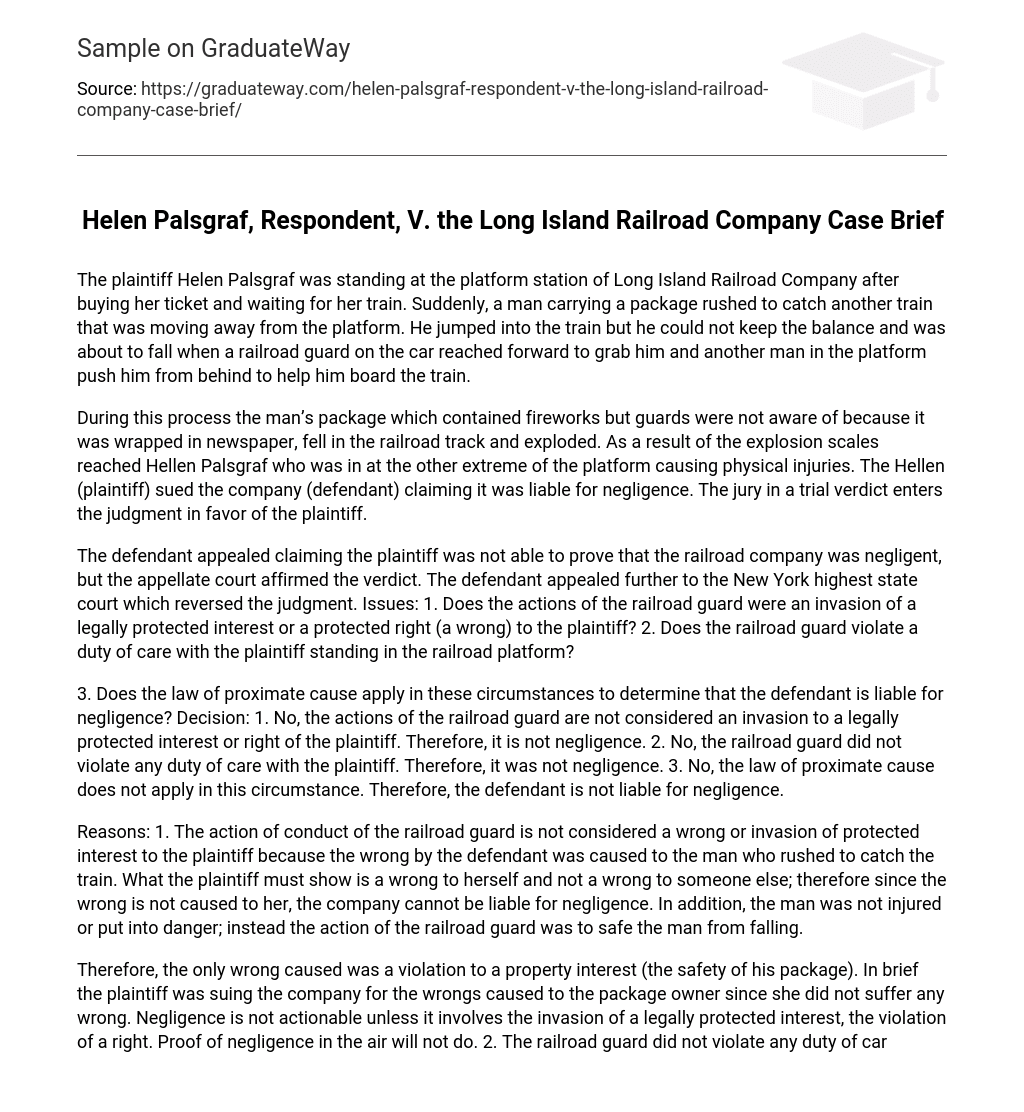The plaintiff, Helen Palsgraf, was on the platform station of Long Island Railroad Company. She had recently purchased her ticket and was waiting for her train. Suddenly, a man with a package attempted to board another departing train from the platform. As he jumped onto the train, he lost his balance and was on the verge of falling. A railroad guard on the train extended his arm to catch him while another individual on the platform pushed him from behind to aid in boarding.
During the incident, a package belonging to a man fell onto the railroad track and exploded. The package was wrapped in newspaper and contained fireworks. Tragically, Hellen Palsgraf suffered physical injuries from the explosion while standing at the opposite end of the platform. Consequently, Hellen (the plaintiff) decided to sue the company (the defendant), holding them accountable for negligence. Following a trial, the jury ultimately favored the plaintiff and issued a judgment.
The defendant filed an appeal, claiming that the plaintiff did not provide sufficient evidence to prove the negligence of the railroad company. Nevertheless, the appellate court affirmed the decision. Subsequently, the defendant appealed to New York’s highest state court, which ultimately reversed the judgment. The main issues at hand are as follows: 1. Did the actions of the railroad guard violate a legally protected interest or right (a wrongdoing) against the plaintiff? 2. Did the railroad guard fail in their duty of care towards the plaintiff while on the railroad platform?
3. Is the law of proximate cause applicable here to establish the defendant’s liability for negligence? Decision: 1. No, the actions of the railroad guard do not constitute a violation of a legally protected interest or right of the plaintiff, hence not amounting to negligence. 2. No, the railroad guard did not breach any duty of care towards the plaintiff, thereby ruling out negligence. 3. No, the law of proximate cause has no relevance in this specific situation, thereby relieving the defendant from liability regarding negligence.
Reasons for the railroad guard not being considered at fault or violating the plaintiff’s rights:
1. The defendant’s actions did not cause harm or pose a threat to the plaintiff. It was the man rushing to catch the train who was affected by the defendant’s actions.
2. The plaintiff needs to demonstrate that she herself was wronged, not someone else. Since the harm was not directed towards her, the company cannot be held liable for negligence.
3. Furthermore, the man was not injured or endangered; instead, the railroad guard’s actions were meant to protect him from falling.
In summary, the plaintiff filed a lawsuit against the company for damaging the package, which violated their property interest in ensuring its safety. This was the sole wrongdoing under consideration and it’s crucial to recognize that the plaintiff did not personally experience any harm. It is also important to note that negligence can only be legally pursued when it infringes upon a protected interest or violates a right. Merely proving negligence in an airborne situation is not enough. Furthermore, the railroad guard cannot be held accountable for any breach of duty towards the defendant since they were unaware of both the package’s existence and its contents (fireworks).
In addition, the package lacked any clear indication that it contained fireworks. It was entirely unsuspecting that the parcel, wrapped in newspaper, would cause destruction in the station. Had the railway guard known about the fireworks and failed to inform the plaintiff, it would have constituted negligence on his part and a breach of his duty of care.
The package did not display any indications or characteristics suggesting it contained fireworks, so the defendant was unaware of the explosives inside and did not inform the plaintiff about the potential damage when it fell. Consequently, the defendant’s failure to warn the plaintiff was unintentional and cannot be held liable for negligence. Therefore, as there was no negligence, establishing proximate cause becomes impossible.





